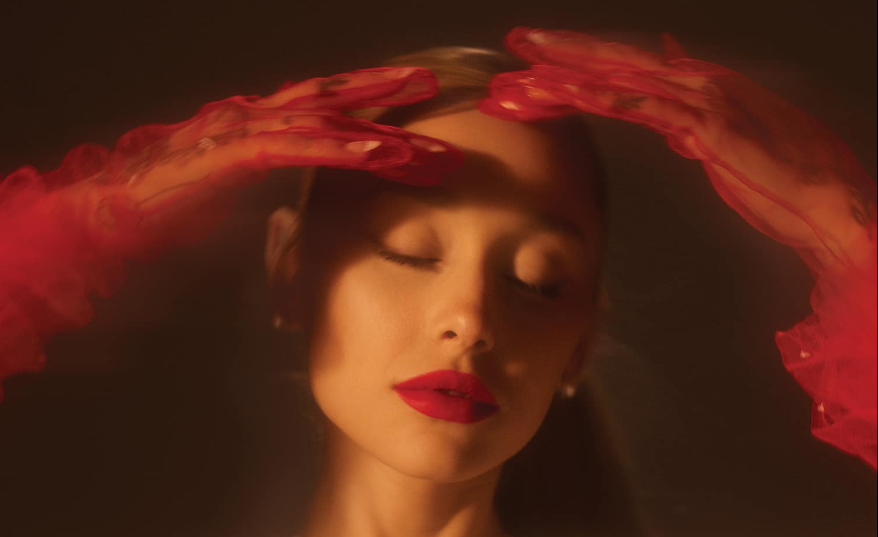
Music Critic Jaya Midda talks us through Ariana Grande’s latest album
The pop princess is back!
After a prolonged hiatus dedicated to her acting career, Ariana Grande marks an exceptional return to the music scene with her seventh studio album, Eternal Sunshine. Despite the initial anticipation of a Madonna-inspired dance album, teased by the playful lead single ‘Yes And?,’ Grande takes a surprising detour from expectations, offering a deeper and more introspective musical journey. Drawing inspiration from the 2004 sci-fi romance film Eternal Sunshine of the Spotless Mind, the album title suggests a lyrical narrative of erasing painful memories of lost love and delving into profound reflections of heartbreak and healing. Each track offers a glimpse into Grande’s self-discovery, inviting listeners to join her in a very human, cathartic exploration of love and loss.
Grande sets the tone for a narrative that traverses the complexities of post-breakup emotions, which echoes throughout the rest of the album
Introduced with a question, ‘how can I tell if I’m in the right relationship?,’ Grande sets the tone for a narrative that traverses the complexities of post-breakup emotions, which echoes throughout the rest of the album. The opening track, ‘Intro (end of the world),’ captures the initial anguish of lost love, juxtaposing the album title with the lyrics ‘If the sun refused to shine, baby, would I still be your lover?,’ encapsulating the sensation of feeling like it is the ‘end of the world’ after a breakup. However, Grande’s choice to begin with this sense of despair, as she delves into the concept of viewing endings as new beginnings, suggests that the journey towards healing requires one to acknowledge and embrace these painful emotions before reaching a state of inner peace.
Following on, we dive into ‘Bye,’ a lively and disco-infused track rooted in self-awareness. Grande shared in an interview with Zach Sang that, despite its vibrant tone, ‘Bye’ presented the greatest challenge during the writing process. She expressed a desire to avoid sounding resentful or vengeful toward a former partner, endeavouring instead to infuse the lyrics with civility as a follow up to the album’s introductory track, leading with compassion rather than bitterness. The line ‘I can’t believe I’m finally moving through my fears’ marks a transition from an emotional outset to gradual healing, embracing the realisation that bidding farewell to a person or situation can be done without harbouring hatefulness, all in pursuit of one’s own mental well-being and happiness.
Grande emphasises her the title in her single ‘We Can’t Be Friends,’ as the music video vividly portrays the journey of Peaches, the film’s protagonist, as she erases memories of a past love to rediscover herself and move forward. Above all, the song delves into the depth of human emotion, illustrating the impact of sharing one’s heart with another and the pain of its cessation. It shows the capacity of the human heart to love deeply, even amidst the anguish of heartbreak. Fans have also speculated that ‘We Can’t Be Friends’ might reflect Grande’s experiences with the media, given her long-standing presence in the spotlight. In the Sang interview, she described feeling constantly ridiculed and misunderstood, with the public often seizing upon isolated details about her, ‘cherry-picking’ without context and constructing false narratives. The lyrics ‘let this story die’ and ‘don’t love how you paint me’ capture this sense of being misunderstood and dehumanised by the media, resonating with Grande’s struggle to maintain authenticity amidst public scrutiny.
I consider ‘I Wish I Hated You’ to be the most emotionally charged song on the album
I consider ‘I Wish I Hated You’ to be the most emotionally charged song on the album. Grande herself has expressed that it is too vulnerable for her to perform live or even listen to. In the lyrics, she explores the idea that you can acknowledge the positive qualities of an ex-partner without demonising them to move on. Instead of painting an ex as a monster, she recognises that the relationship simply was not right for her. This song, positioned near the end of the album, reflects a sense of mourning while also embracing healing with kindness rather than vengeance. Stating ‘I hope life brings you no new pain,’ Grande expresses her wishes for her ex’s well-being and leaves them with love, suggesting that holding onto resentment may hinder the healing process. Ultimately, the song serves as a reminder that letting go of hatred is essential for moving forward, even though it may seem like the easier option to hate someone at times.
One personal favourite feature of the album is its circular structure, which begins with a question and concludes with an answer from Grande’s Nonna (Grandma). Nonna suggests that recognising you are in the right relationship means understanding that if you are not receiving the love and affection you deserve, then ‘get out, you’re in the wrong place.’ This final message reaffirms the album’s central theme: it is courageous for a woman to walk away from anything that doesn’t fulfil her or align with her needs and desires.
Rating: 9.5/10
Enjoyed this? You might also like…
Comments